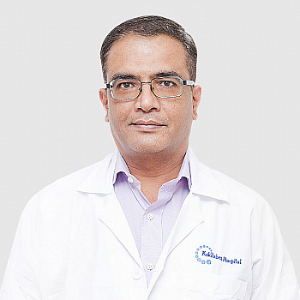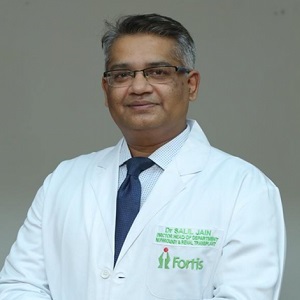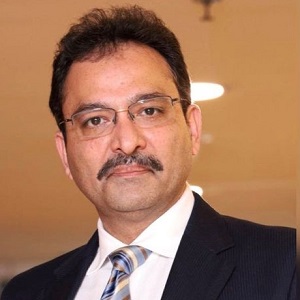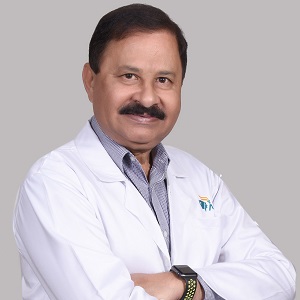Best Doctors in India for Alcoholic Hepatitis Treatment
- Top Cardio Thoracic & Vascular Surgeon | Apollo Hospital, New Delhi, India
- 21+ years experience
- Indraprastha Apollo Hospital, New Delhi
Profile Highlights:
- Dr. Mukesh Goel is a distinguished Cardiothoracic and Vascular Surgeon with an impressive 21 years of experience in the field.
- Currently affiliated with Apollo Hospitals Indraprastha in New Delhi, Dr. Goel is renowned for his expertise in managing complex cardiac and vascular conditions.
- His extensive qualifications include an MBBS, MS, and MCh, which equip him with the comprehensive knowledge required to handle a diverse range of cardiovascular and thoracic disorders.
- Top Nephrologist | Max Hospital, Saket, New Delhi, India
- 20+ Years Experience
- Max Super Specialty Hospital, Saket, New Delhi
Profile Highlights:
- Dr. Rahul Grover is a leading nephrologist with over 14 years of experience in the field of nephrology and kidney transplantation.
- Currently, he serves as the Associate Director of Nephrology at Max Healthcare, where he is recognized for his expertise in treating complex renal conditions.
- His special interests include kidney transplantation, particularly in complex cases such as sensitized and ABO-incompatible transplants. Dr. Grover is also skilled in hemodialysis and Continuous Ambulatory Peritoneal Dialysis (CAPD), as well as critical care nephrology.
- Dermatologist, Gurugram, New Delhi, India
- 15+ years’ experience
- Fortis Memorial Research Institute
Profile Highlights:
- Dr. Sonal Bansal is a highly skilled and dynamic dermatologist with over 15 years of experience in Clinical and Cosmetic Dermatology.
- Her commitment to the field is evident through her associations with several esteemed institutions, including Max Hospital, Apollo Clinics, Kaya Skin Clinic, Three Graces Cosmetic Dermatology Clinic, and Skin Alive Skin Clinic.
- Her practice is distinguished by a holistic approach to patient care, emphasizing comprehensive treatment that addresses both medical and aesthetic needs.
- Top Surgical Oncologist | Kokilaben Hospital, Mumbai, India
- 22+ Years Experience
- Kokilaben Dhirubhai Ambani Hospital
Profile Highlights:
- Dr. Yogesh Kulkarni is a well-known name in the field of Gynae Onco surgery.
- He holds an experience of more than 22 years and has performed more than 2000 gyne oncological surgeries.
- Dr. Yogesh Kulkarni has performed over 1000 gyne cancer surgeries in the hospital. He also holds the credit for 500 ovarian, 250 endometrial, 214 cervical cancer surgeries, and 144 robotic cancer surgeries at KDAH alone.
- He gained popularity when he performed the first Reported Fertility Sparing Surgery for Cervical Carcinoma on a 4-year-old for clear cell cervical carcinoma
- Top Surgical Oncologist | Apollo Hospital, New Delhi, India
- 40+ Years Experience
- Indraprastha Apollo Hospital, New Delhi
Profile Highlights:
- Dr. Ramesh Sarin, a distinguished Consultant in Surgical Oncology at Indraprastha Apollo Hospital, New Delhi
- Dr. Ramesh Sarin brings over 40 years of unparalleled expertise in the field of oncology, with a specialized focus on breast cancer and breast diseases.
- She obtained her MBBS and MS degrees before moving to the United Kingdom, where she earned her prestigious FRCS degree and worked for six years.
- Medical Oncologist, Chennai, India
- Over 28 years’ experience
- Apollo Cancer Centre Chennai
Profile Highlights:
- Dr. Sankar Srinivasan is one of the top Medical Oncologists in India with proficiency in cancer management for about 28 years.
- He got certified in Internal Medicine, Medical Oncology, and Hematology from American Board to enhance his skills.
- Dr. Srinivasan is placed in the best 10% of the Hematologists boards.
- He is an active member of several International Medical Association Boards.
- Nephrologist, Gurugram, India
- Over 24 years’ experience
- Fortis Memorial Research Institute
Profile Highlights:
- Dr. Salil Jain, MBBS, MD, DNB (Nephrology), is a highly esteemed Senior Director and Head of the Department of Nephrology & Renal Transplant at Fortis Hospital, Gurgaon.
- With over 24 years of experience, Dr. Jain is recognized as one of the leading nephrologists in the Delhi and Gurgaon regions.
- His expertise spans across nephrology and organ transplant, with a special focus on kidney transplants.
- Top Bariatric & Laparoscopic Surgeon | Max Hospital, Saket, New Delhi, India
- 25+ Years Experience
- Max Super Specialty Hospital, Saket, New Delhi
Profile Highlights:
- Dr. Manish Baijal is an experienced, proficient, and renowned Bariatric Surgeon and the credit for doing scarless neck surgery for Thyroid and Para Thyroid Diseases for the first time goes to him.
- He also performs surgery for Morbid Obesity (Weight Loss) and Metabolic Disorders (Bariatric Surgery) with much dexterity.
- He has acquired great fame for performing surgery on abdominal Wall Hernias. Besides these, he also does Biliary surgeries like Gall Bladder Stone, Common Bile Duct Surgery, etc.
- Top Endocrinologist & Diabetologist | Rela Hospital, Chennai, India
- 14+ Years Experience
- Dr. Rela Institute & Medical Centre
Profile Highlights:
- Dr. Chandrasekaran currently serves as a Senior Consultant Endocrinologist and Diabetologist at the Rela Institute of Medical Science in Chennai, where she continues to provide exceptional care and advance her field.
- With a comprehensive academic background including MBBS, ABIM, and AB in Endocrinology, Diabetology & Metabolism, Dr. Chandrasekaran has developed a robust specialization in managing pituitary, adrenal, and gonadal disorders.
- Top Dermatologist | Apollo Hospital, New Delhi, India
- 35+ Years Experience
- Indraprastha Apollo Hospital, New Delhi
Profile Highlights:
- He is currently affiliated with Apollo Hospitals Indraprastha in New Delhi.
- Dr. Mahajan holds an MBBS and an MD in Dermatology and is recognized for his expertise in treating a broad spectrum of dermatological conditions, including acne, acne scars, age spots, allergic reactions, and more.
- Dr. D M Mahajan is a highly esteemed Dermatologist with over 35 years of experience in providing exceptional skin care.
Best Hospitals in India for Alcoholic Hepatitis Treatment
ALCOHOLIC HEPATITIS
Alcoholic hepatitis is a liver infection, which is mainly caused by frequent, heavy use of alcohol. Fat can build up in the liver cells, which might lead to inflammation as well as scarring of the liver.
Alcoholic hepatitis might be mild or severe. A patient might even need a liver transplant if proper treatment is not provided, or if they don’t stop consumption of alcohol.
It is also notable that all heavy drinkers don’t develop this condition, and sometimes this condition even develops in people who drink moderately. However, if you are diagnosed with this condition, it is important for you to quit drinking alcohol. People who continue drinking alcohol might face a huge risk of serious liver damage as well as death.
Symptoms
Depending on the amount of damage to the liver, the symptoms can vary. If you are having a mild form of the disease, you might not even experience any symptoms at all. However, as the damage continues to grow, you might experience the following:
- Changes in appetite
- Dry mouth
- Weight loss
- Pain or swelling in the abdomen
- Jaundice, or yellowing of the skin or eyes
- Fever
- Nausea and vomiting
- Easy bleeding or bruising
- Changes in your mental state, including confusion
- Fatigue
The symptoms of this condition are similar to those caused by a few other health conditions. Therefore, if you develop any of these symptoms, it is best to get a proper diagnosis as well as begin treatment.
Causes & risk factors
Alcoholic hepatitis generally develops when the alcohol you drink causes damage to your liver. However, it is not clear why alcohol does this damages only to some heavy drinkers.
Few factors that are known to play a role in this condition include:
- The body’s process that breaks down alcohol produces some toxic chemicals
- These chemicals can trigger inflammation that can destroy the liver cells
- Thus, over time, scars replace healthy liver tissue, thus interfering with the function of the liver
- This irreversible scarring, which is also termed cirrhosis, is the final stage of alcoholic liver disease
If you have hepatitis C and continue to drink, even moderately, you are more likely to develop cirrhosis.
Some heavy drinkers are also malnourished because they don’t eat a proper balanced diet. Alcohol and its byproducts also prevent the body from absorbing nutrition properly. Lack of nutrition can contribute to liver cell damage.
Some other risk factors that can lead to this condition include:
- Your sex- Women are usually at a higher risk of developing alcoholic hepatitis since the way alcohol is processed in women is different.
- Binge drinking- Having over five drinks within two hours for men and four or more for women can increase the risk of alcoholic hepatitis.
- Obesity- Heavy drinkers who are overweight are also more likely to develop alcoholic hepatitis and to progress from that condition to cirrhosis.
- Race and ethnicity- Hispanic and Negroid people might be at higher risk of alcoholic hepatitis.
- Genetic factors- According to studies, there may be a genetic component in alcohol-induced liver disease. However, it is difficult to separate genetic and environmental factors.
Diagnosis
If you are showing symptoms of alcoholic hepatitis, your doctor will first inquire about your medical history and alcohol consumption. Next, he/she will perform a physical exam to see if you have an enlarged liver or spleen. They might also need a few more tests to confirm your diagnosis, such as:
- Complete blood count (CBC)
- Liver function test
- Ultrasound of the liver
- Abdominal CT scan
- Blood clotting tests
In some cases, a liver biopsy might also be needed to confirm the diagnosis of alcoholic hepatitis. A liver biopsy requires your doctor to remove a tissue sample from your liver, which is then tested in the lab. This method helps to show the severity and type of liver disease.
Treatment
Stopping alcohol consumption is the most important treatment for alcoholic hepatitis. There is no cure for this condition, but treatment can help in reducing or eliminating symptoms, or stopping its progression.
It is also important to note that scarring of the liver is permanent, but treatment can aim to restore as much function as possible.
Dietary changes
Medication
Liver transplant
The best hope of recovery is to be aware of the signs and symptoms as well as to reduce, manage, or if possible, completely stop consumption of alcohol.
Complications
Alcoholic hepatitis might lead to severe other complications such as:
- Enlarged veins (varices)- In this condition, blood that is unable to flow freely through the portal vein, can back up into other blood vessels in your esophagus or stomach.
- Hepatic encephalopathy- This condition can be caused by the buildup of toxins if your damaged liver is unable to remove all the toxins from your body. It involves confusion, drowsiness, and slurred speech.
- Ascites- Ascites is a condition in which the fluid that accumulates in the abdomen may get infected and thus, require treatment with antibiotics. Although this condition is not life-threatening, it can be a sign of advanced alcoholic hepatitis, or cirrhosis.
- Kidney failure- A damaged liver affects blood flow to the kidneys, thus resulting in kidney failure.
- Cirrhosis- The scarring of the liver might lead to liver failure.
Prevention
Alcoholic hepatitis might be prevented if you take the following steps:
- Drink alcohol in moderation, if at all- For healthy adults, moderate drinking means no more than one drink a day for women of all ages and men older than 65, and not over two drinks a day for men aged 65 and younger. However, if you prevent all alcohol, it is a certain way to prevent this condition.
- Check before mixing medications and alcohol- Ask your doctor if it’s safe to drink alcohol while you are taking medications. Consider reading the warning labels on over-the-counter medications as well. Don’t drink alcohol when you are taking medications that warn of complications when combined with alcohol.
- Protect yourself from hepatitis C- Hepatitis C is an infectious liver disease that is caused by a virus. If it is left untreated, it may lead to cirrhosis. If you are having hepatitis C and you consume alcohol, you’re generally more likely to develop cirrhosis than if you don’t drink.















